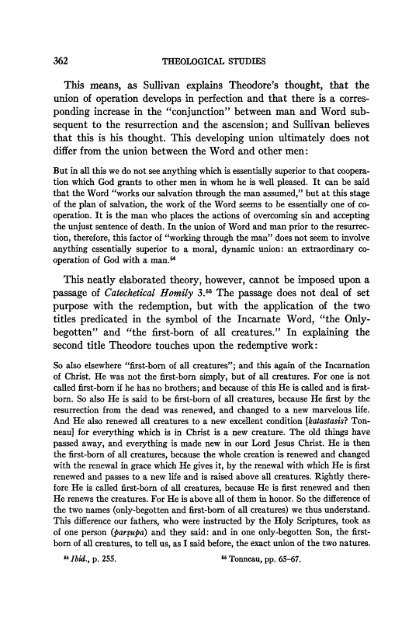ANNOTATIONS ON THE CHRISTOLOGY OF THEODORE OF ...
ANNOTATIONS ON THE CHRISTOLOGY OF THEODORE OF ...
ANNOTATIONS ON THE CHRISTOLOGY OF THEODORE OF ...
Create successful ePaper yourself
Turn your PDF publications into a flip-book with our unique Google optimized e-Paper software.
362 <strong>THE</strong>OLOGICAL STUDIES<br />
This means, as Sullivan explains Theodore's thought, that the<br />
union of operation develops in perfection and that there is a corresponding<br />
increase in the "conjunction" between man and Word subsequent<br />
to the resurrection and the ascension; and Sullivan believes<br />
that this is his thought. This developing union ultimately does not<br />
differ from the union between the Word and other men:<br />
But in all this we do not see anything which is essentially superior to that cooperation<br />
which God grants to other men in whom he is well pleased. It can be said<br />
that the Word "works our salvation through the man assumed," but at this stage<br />
of the plan of salvation, the work of the Word seems to be essentially one of cooperation.<br />
It is the man who places the actions of overcoming sin and accepting<br />
the unjust sentence of death. In the union of Word and man prior to the resurrection,<br />
therefore, this factor of "working through the man" does not seem to involve<br />
anything essentially superior to a moral, dynamic union: an extraordinary cooperation<br />
of God with a man. 54<br />
This neatly elaborated theory, however, cannot be imposed upon a<br />
passage of Catechetical Homily 3. 56 The passage does not deal of set<br />
purpose with the redemption, but with the application of the two<br />
titles predicated in the symbol of the Incarnate Word, "the Onlybegotten"<br />
and "the first-born of all creatures." In explaining the<br />
second title Theodore touches upon the redemptive work:<br />
So also elsewhere "first-born of all creatures"; and this again of the Incarnation<br />
of Christ. He was not the first-born simply, but of all creatures. For one is not<br />
called first-born if he has no brothers; and because of this He is called and is firstborn.<br />
So also He is said to be first-born of all creatures, because He first by the<br />
resurrection from the dead was renewed, and changed to a new marvelous life.<br />
And He also renewed all creatures to a new excellent condition [katastasis? Tonneau]<br />
for everything which is in Christ is a new creature. The old things have<br />
passed away, and everything is made new in our Lord Jesus Christ. He is then<br />
the first-born of all creatures, because the whole creation is renewed and changed<br />
with the renewal in grace which He gives it, by the renewal with which He is first<br />
renewed and passes to a new life and is raised above all creatures. Rightly therefore<br />
He is called first-born of all creatures, because He is first renewed and then<br />
He renews the creatures. For He is above all of them in honor. So the difference of<br />
the two names (only-begotten and first-born of all creatures) we thus understand.<br />
This difference our fathers, who were instructed by the Holy Scriptures, took as<br />
of one person (parsupa) and they said: and in one only-begotten Son, the firstborn<br />
of all creatures, to tell us, as I said before, the exact union of the two natures.<br />
64 Ibid., p. 255. Tonneau, pp. 65-67.
















